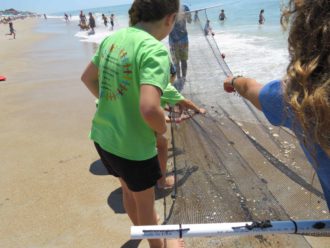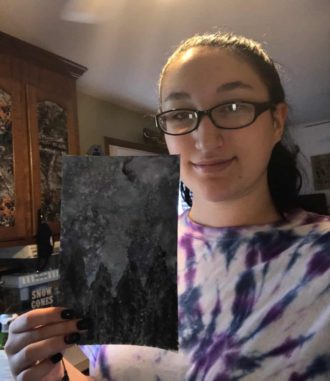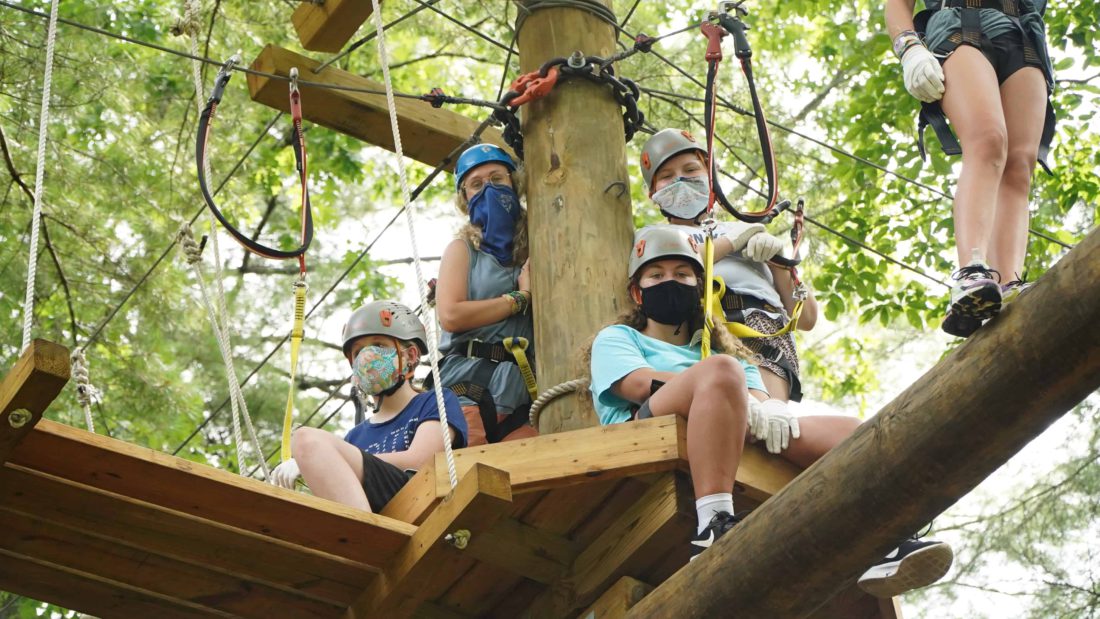Eleven-year-old Averie M. spent time this summer learning how to zipline, rock climb and do gymnastics at a summer camp in Transylvania County.
“The activities were very fun and you tried new things that you didn’t think you would be able to do,” she said.
Averie was lucky to go to sleep-away camp this year when many other camps and activities for kids were shut down as a result of the coronavirus pandemic.
Others camped from home on screens and devices that provided them opportunities to link up with people even without the s’mores, campfire songs and bonding activities of summers past.
As the traditional school year is about to start again in North Carolina, students will not return to virtual or in-person classes with camp stories.
Just as the pandemic changed how students take classes, it also changed how day and overnight camps offered summer activities.
Kelsey Sisk, 15, attended a virtual camp for Girl Scouts this summer and met new friends online, a platform that helped her to get outside her comfort zone and interact with people she might not have otherwise met.

Some kids took a splash in a pool or played and did camp activities on-site with counselors and fellow campers.
Others went to virtual camp. Many camps were closed, either because opening them under the strict COVID-19 prevention protocols would not have been feasible, or because a counselor or camper tested positive for the virus during the session.
That’s what happened in Raleigh, when a city-run day camp had to greet parents with the news that on July 5, the day the camp opened, someone tested positive for COVID-19.
The quick camp shutdown generated an email to 24 families who were told to have their child tested, said Kellee Beach, a city administrator.
Those children, who had a day to run around somewhere different and be around peers they had been cut off from when schools closed to in-classroom instruction in March, were back in their homes, where parents once again had to juggle child care with work schedules.
Too much screen time?
Because kids are staying home and often playing video games or increasing their screen time on various devices, some of them have not been as physically active this summer.
“Kids could be a lot healthier,” James F. Sallis, the director of Physical Activity Center at the University of San Diego, said during an American Heart Association media briefing last month.
Children should have at least an hour of physical activity daily, Sallis said. That activity stimulates kids’ brains.
A study conducted last year at the University of San Diego, before anyone could fathom the pandemic’s impact on children, found that physical activity was lower by 14 minutes in the summer for kids from all racial backgrounds and that their screen time was significantly higher. The largest increase in screen time was found to be among African American children.
“This is evidence that we could do more to help kids be active,” said Sallis, one of the study authors.
To help change those numbers, Sallis suggested that youth-focused organizations set up group walks with kids and advocate for safe physical activities in every neighborhood, specifically in low-income communities of color.
Virtual does not exclude physical
Though camps and schools have gone virtual, physical activity and new adventure can be incorporated into all that screen time.
For instance, some virtual youth camps in the state have allowed children to connect with kids living in other states and countries.
River of Life Church in Onslow County hosted a five-day virtual vacation bible school through Facebook Live. Each day there were over 500 views from children all over the United States and in Brazil.
“With everything going on, we felt we would reach more people by having a virtual vacation bible school,” said Pastor Jackie Hornage.
All the videos were pre-recorded in a day at the church, according to Hornage. The bible school leaders had their children on stage with them as they shared the lessons.
The children spun, clapped and jumped on stage in their VBS shirts. For one of the outdoor activities, the kids sat on the ground and quickly passed wet sponges over their heads to another camper.
Sandra Adams, one of the vacation bible school leaders at the church for the past decade, said it was different this year by “not having the kids in the room to feed off of their energy.”
Prior to online camps beginning, some organizations mailed out craft kits for kids registered for the camp or had a drive-thru set up where the daily crafts could be picked up.
Zooming in on solutions
N.C. State University College of Engineering hosted their summer camps through Zoom with professors from the department. All of the kids who were registered learned how to be creative in solving daily problems by completing challenges, from how to survive on a deserted island to environmental engineering. Some of the items in the craft kits for eighth graders were a Barbie doll and modeling clay that was used to form a helmet or other safety equipment.
“They’re not just (on Zoom) to sit and listen to stuff we have to say; we want to hear from them,” said Susan D’Amico, the camp director at NC State. “We want them to talk and come up with creative ideas, talk amongst themselves, and use the breakout rooms, and just learn how to connect again.”

D’Amico said that parents expressed gratitude for the virtual experience after the College of Engineering decided to move their summer camps to online only.
Some Girl Scout troops in the state also resorted to using Zoom so scouts could continue to earn badges while camping and trip excursions for the organization were canceled.
Girl Scouts Carolina Peaks to Piedmont created stay-at-home Kamp Kits that allow girls to practice camping, craft skills, and learn about Science Technology Engineering and Mathematics (STEM) on Zoom with other Girl Scouts across the United States.
“It was great!,” said Sisk, a senior Girl Scout from Camp Ginger Cascade. “It was a lot better than I thought it was going to be. It was well-planned out, the staff were great! It was so much fun!”
Despite creatively pivoting to provide kids with summer fun, more than $16 billion of revenue was lost this summer from youth camps across the United States because of closures, according to the American Camp Association.
Camps, like schools, provide safety net
Despite the costs associated with living up to camp guidance provided by the Centers for Disease Control and Prevention, some organizations offered services, knowing that even in a pandemic year some children rely on them for food and nutrition, much like the schools.
Goldsboro Family YMCA day camp is partially funded through the Summer Food Service Program, ensuring all kids will receive a breakfast and lunch, and sometimes a snack when they take field trips.
“While the kids were at home, we weren’t sure if kids were getting fed,” Kriquette Davis, a camp director at Camp Sunshine said.
Prior to the camp opening for the summer, Goldsboro Family YMCA partnered with United Way and Chick-Fil-A to provide hot meals for over 19,000 kids in Wayne County.
Once open, Camp Sunshine campers were divided into groups of nine, staying under the 10-person limit for indoor activities that public health experts and Gov. Roy Cooper’s executive orders mandate.
Campers older than 11 were encouraged to wear masks and camp sites were cleaned thoroughly by staff.
The Goldsboro Family YMCA also offered a Summer Skills Sports Camp for young athletes. This year, instead of playing full-on games for close-contact sports such as basketball, they only performed drills such as passing the ball back and forth.
Jacksonville Parks and Recreation in Onslow County took only about 150 campers this year, instead of their usual 210 kids. Their strategy was to keep kids outside, where transmission of COVID is less likely. The organization took campers on field trips to nature trails, and to visit a sea turtle hospital. On hot days, campers stayed cool with water-based activities.
Some overnight camps opened, though 60% of overnight camps across the country decided not to open this year, according to the American Camp Association.
Some in North Carolina decided to give it a go.
“We really think as long as we all understand that we’re doing the best we can do, then we can continue to live our lives and take that calculated risk together,” said Page Lemel, a camp director at Keystone Camp, a camp for girls ages 7 to 14 in Transylvania County.
The campers were placed in small groups that stayed together for activities and meals to try to limit the potential for virus spread and contain it quickly if someone is infected.
Lemel said that in the past camps had dealt with epidemics, such as flu, norovirus and head lice, so they had experience in limiting infection. For instance, camps were in operation during the dreaded polio epidemic of the 1950s.
“It was very important for us to be able to host these smaller groups to understand the new normal,” Lemel said.
North Carolina Health News is an independent, nonpartisan, not-for-profit, statewide news organization dedicated to covering all things health care in North Carolina. Visit NCHN at www.northcarolinahealthnews.org.
This article first appeared on North Carolina Health News and is republished here under a Creative Commons license.



Before you comment
The comments section is here to provide a platform for civil dialogue on the issues we face together as a local community. Xpress is committed to offering this platform for all voices, but when the tone of the discussion gets nasty or strays off topic, we believe many people choose not to participate. Xpress editors are determined to moderate comments to ensure a constructive interchange is maintained. All comments judged not to be in keeping with the spirit of civil discourse will be removed and repeat violators will be banned. See here for our terms of service. Thank you for being part of this effort to promote respectful discussion.